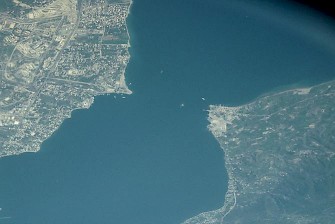Thucydides on the first victory of Phormio

The Archidamian War (431-421) has been called a fight between an elephant and a whale because Sparta had a strong army and Athens had a strong navy. If Sparta wanted to defeat Athens and "liberate Greece" - its official war aim - it would have to gain control of the sea. Fortunately, it had allies with a fleet, especially Corinth, which hated Athens. The Athenian admiral Phormio was sent around the Peloponnese to Naupactus, at the entrance of the Gulf of Corinth, where he could obstruct all traffic between Corinth and its colonies in the west, especially Acarnania and Corcyra. This forced Sparta's foremost naval ally to send a large navy to the west: 47 ships, including a couple of Spartan galleys.
Phormio, who commanded 20 ships, was able to force his enemies to battle near Patras - or, to be more precise, near Rion and Antirion. Immediately, the Spartans and Corinthians took a defensive position that is called kyklos, "the wheel". Still, Phormio was able to defeat them. Later, Phormio defeated his opponents a second time. In this way, the Spartans learned that they still had to learn much before they could overcome Athens.
Thucydides describes the first fight. His account is a classical description of a naval battle. The translation of History of the Peloponnesian War 2.83.2-85.2 was made by Richard Crawley.
Phormio's first victory
[2.83.2] Meanwhile the fleet from Corinth and the rest of the confederates [...] was compelled to fight with Phormio and the twenty Athenian vessels stationed at Naupactus.
[2.83.3] For they were watched, as they coasted along out of the gulf, by Phormio, who wished to attack in the open sea.
[2.83.4] But the Corinthians and allies had started for Acarnania without any idea of fighting at sea, and with vessels more like transports for carrying soldiers; besides which, they never dreamed of the twenty Athenian ships venturing to engage their forty-seven.
However, while they were coasting along their own shore, there were the Athenians sailing along in line with them; and when they tried to cross over from Patras in Achaea to the mainland on the other side, on their way to Acarnania, they saw them again coming out from Chalcis and the river Evenus to meet them. They slipped from their moorings in the night, but were observed, and were at length compelled to fight in mid passage.
Each state that contributed to the armament had its own general; the Corinthian commanders were Machaon, Isocrates, and Agatharchidas.
[2.83.5] The Peloponnesians ranged their vessels in as large a circle as possible without leaving an opening, with the prows outside and the sterns in; and placed within all the small craft in company, and their five best sailors to issue out at a moment's notice and strengthen any point threatened by the enemy.
[2.84.1] The Athenians, formed in line, sailed round and round them, and forced them to contract their circle, by continually brushing past and making as though they would attack at once, having been previously cautioned by Phormio not to do so till he gave the signal.
[2.84.2] His hope was that the Peloponnesians would not retain their order like a force on shore, but that the ships would fall foul of one another and the small craft cause confusion; and if the wind should blow from the gulf (in expectation of which he kept sailing round them, and which usually rose towards morning), they would not, he felt sure, remain steady an instant. He also thought that it rested with him to attack when he pleased, as his ships were better sailors, and that an attack timed by the coming of the wind would tell best.
[2.84.3] When the wind came down, the enemy's ships were now in a narrow space, and what with the wind and the small craft dashing against them, at once fell into confusion: ship fell foul of ship, while the crews were pushing them off with poles, and by their shouting, swearing, and struggling with one another, made captains' orders and boatswains' cries alike inaudible, and through being unable for want of practice to clear their oars in the rough water, prevented the vessels from obeying their helmsmen properly. At this moment Phormio gave the signal, and the Athenians attacked. Sinking first one of the admirals, they then disabled all they came across, so that no one thought of resistance for the confusion, but fled for Patras and Dyme in Achaea.
[2.84.4] The Athenians gave chase and captured twelve ships, and taking most of the men out of them sailed to Molycrium, and after setting up a trophy on the promontory of Rhion and dedicating a ship to Poseidon, returned to Naupactus.
[2.84.5] As for the Peloponnesians, they at once sailed with their remaining ships along the coast from Dyme and Patras to Cyllene, the Eleian arsenal [...].
[2.85.1] The Spartans now sent to the fleet three commissioners - Timocrates, Bradidas, and Lycophron - with orders to prepare to engage again with better fortune, and not to be driven from the sea by a few vessels;
[2.85.2] for they could not at all account for their discomfiture, the less so as it was their first attempt at sea; and they fancied that it was not that their marine was so inferior, but that there had been misconduct somewhere, not considering the long experience of the Athenians as compared with the little practice which they had had themselves. The commissioners were accordingly sent in anger.